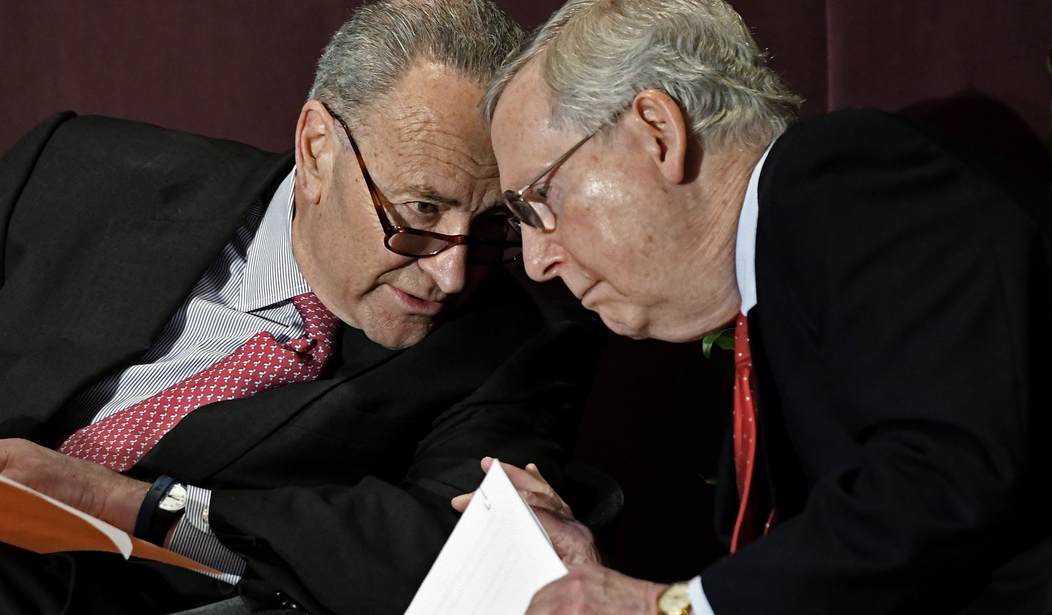Looks like the US will avoid a strike by rail workers. It also looks like the Senate deal tossed Joe Biden’s union allies under a bus — with most of the tossing done by the White House.
Within the last hour, Chuck Schumer announced an agreement in the Senate on the first House bill to impose the deal quarterbacked by Biden onto both sides. The Senate agreement got facilitated, according to Politico’s Burgess Everett, by Biden’s White House — which told the Senate not to attempt to amend the deal:
Administration also told Senate Democrats the fight for more sick leave isn’t over but the only option to avoid rail shutdown was to pass agreement, per senators
— Burgess Everett (@burgessev) December 1, 2022
Biden himself addressed the issue somewhat obliquely this afternoon as well. In a joint presser with French president Emmanuel Macron, Biden pledged to keep working to get paid sick days into the national contract. It won’t be this time, however, he conceded. As Bloomberg’s Jordan Fabian also reported, Biden tried to buffer the blowback by reminding unions what he accomplished for them in this round of bargaining — but, er, um …
Biden, in his answer, said the tentative agreement he helped broker with union leaders and railroads in Sept, which was rejected and now Congress is voting to impose, provided a 43 or 45% pay increase for workers. It is actually 24%, with an ~avg of $11K in back pay bonuses
— Jordan Fabian (@Jordanfabian) December 1, 2022
Is Biden lying about what he got, or does he just not know? Embrace the power of and rather than or in these cases.
With that out of the way — presumably, anyway — Schumer now has a sequence of votes in store for the upper chamber, which had already commenced before this post went live. First up will be a proposal to impose another 60-day cooling-off period that would require all sides to restart negotiations, which is both the most rational option and the least likely to pass. After that, comes the meat and potatoes:
The first vote is an amendment by Sen. Dan Sullivan, R-Alaska, that would extend the “cooling off period” giving the relevant parties an extra 60 days beyond the Dec. 8 deadline to keep negotiating an agreement between unions and rail operators.
Then, the Senate will vote on an amendment, championed by Sen. Bernie Sanders, I-Vt., and Democrats to include seven days of paid sick leave for rail workers as part of the agreement.
And finally, the Senate will vote to impose the tentative agreement from September to avert a strike — this is legislation that has already been passed by the House and would head to the president’s desk if approved by the Senate. It was brokered by the White House but not all the unions involved support it.
Each of these will take 60 votes to clear if Senate rules on expedited floor votes are followed. The Sullivan amendment might not even get to 50, given the other agreements apparently in place. [Update: It failed, 26-69.] Neither might the sick-day addition bill, although that might have come close without the Biden White House lobbying against it.
Then, with those poses sufficiently taken for posterity, we can expect a pretty lopsided vote for passage on imposing the previously negotiated deal. I’d guess that will get at least 75 votes, as few senators will want to be seen as voting for a crippling rail strike, but count Sanders especially among the likely objectors. Marco Rubio might stick to his guns too, but the sequence here is designed to give everyone else who demanded the addition of the sick days some political cover for voting to pass the final bill. Hey, I voted to add the sick days, they can claim … and will.
Stay tuned for updates, but we can probably bet on a bill ready for Biden’s signature on his terms, explicitly so in fact, by tomorrow morning. Rail workers will have to go back to work and look for better negotiators the next time the contract approaches its end. They may want to look for better allies, too.
Update: What version of The Matrix produced this moment?
After Cruz voted for the amendment to mandate seven days of paid sick leave for rail workers, he walked over and gave Bernie Sanders a fist bump. Vote is ongoing
— Manu Raju (@mkraju) December 1, 2022
So far, five Republicans have voted for the sick-day addition. Bernie would need 11, with Manchin out.
Update: It’s taking forever for the Senate to close out the vote on the paid sick-leave bill from the House, but it’s failed with 43 nays. Because this is considered under expedited rules, it takes 60 votes to pass on the floor. Next up will be the core bill that imposes the negotiated deal.
Update: As I predicted, the core bill sailed through to passage. It wasn’t even close, not even with a heightened 60-vote threshold. It only drew 15 votes in opposition, in fact, well below the 25 I guessed. So 37 senators either were fine either way on the sick-days issue or were posing.








Join the conversation as a VIP Member